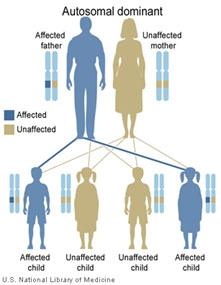Genetics
Most cases of ALPS are caused by mutations in the FAS gene. FAS produces a receptor that, when activated, leads to programmed cell death, or apoptosis. This is an important part of the normal cell lifecycle. When cells do not receive the message that it is time for them to die, an abnormal buildup of cells can result.
There are two types of FAS mutations:
- Germline mutations, which are present in all the body’s cells
- Somatic, or acquired, mutations, which are present only in select groups of cells
Although germline mutations are more common than somatic mutations, people with germline and somatic FAS mutations generally have the same symptoms.
Less commonly, a person with ALPS may have a germline mutation in a gene other than FAS, such as FASLG or CASP10. Less information is available about ALPS due to FASLG or CASP10 mutations because fewer families with these mutations have been identified. Approximately 25 percent of people with ALPS have no detectable mutation in any of these genes, suggesting that other undiscovered genes also are involved in ALPS.
Inheritance

In this example, a parent with an autosomal dominant disorder has two affected children and two unaffected children
ALPS due to FAS mutations is inherited in an autosomal dominant manner, which means that a person only needs an abnormal gene from one parent to have ALPS. The abnormal FAS gene dominates the normal FAS gene from the other parent. This usually means that a parent or relative from the side of the family with the mutation will also have ALPS. Importantly, however, not everyone with an abnormal FAS gene develops ALPS. In fact, up to 40 percent of people with a FAS mutation show no symptoms of ALPS. This genetic phenomenon is called incomplete penetrance. Among those with symptoms of ALPS, some are severely affected by the disorder, while others are not. These variations, called variable expressivity, can be striking, even within the same family.
In a family with a parent who has a FAS mutation, each child has a 50 percent chance of inheriting the mutated FAS gene. The chance of one child inheriting the mutation is independent of whether his or her siblings have the mutation. In other words, if the first three children in a family have the mutation, the fourth child still has a 50 percent chance of inheriting it. Children who do not inherit the abnormal gene will not develop ALPS or pass on the mutation.
Some germline mutations are not inherited but occur as a result of a mutation in the egg or sperm of one of the parents or in the fertilized egg itself. These are called de novo mutations. Approximately 10 percent of ALPS-FAS patients have de novo mutations. De novo mutations can be passed on to children.
Somatic FAS mutations are not inherited and cannot be passed on because the mutation is only present in the blood and not in a person's sex cells.


